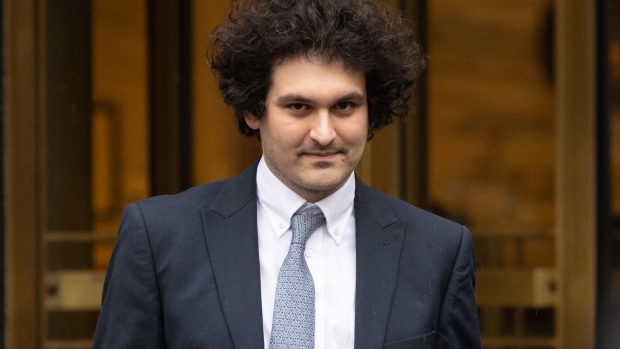Sep 27, 2023
Bankman-Fried Pushes for Jail Release — Again — Ahead of Trial
, Bloomberg News

(Bloomberg) -- Less than a week before Sam Bankman-Fried faces one of the biggest white-collar crime cases in US history, his lawyers are taking one more shot at getting him out of a Brooklyn jail.
They are preparing to go in front of a judge Thursday, five days before his Oct. 3 trial, to argue they face continued challenges in preparing his defense.
The embattled FTX founder meets with his lawyers at a federal jail in Brooklyn, New York, on a regular basis, reviewing evidence on hard drives connected to a laptop because inmates can’t use the Internet. On the two days a week he meets his lawyers at the federal courthouse in Manhattan, the Internet is so slow it can take an entire day to download just one of the millions of pages prosecutors have provided.
Even in the 11th hour, Bankman-Fried’s lawyers refused to give up. Earlier this week, they sent a letter to Judge Lewis Kaplan, imploring him once again to consider the burden incarceration puts on their ability to prepare an adequate defense. It was one of multiple attempts to get Bankman-Fried, who faces up to 20 years in jail on the most serious charge, out of jail.
“In a case this complex, defense counsel believe that we will be unable to properly represent our client at his upcoming trial unless we are able to confer with him and prepare for the next day’s witnesses and exhibits in the hours when we are not sitting in the courtroom,” lawyers Mark Cohen and Christian Everdell said in a late night letter to Kaplan.
Bankman-Fried is accused of orchestrating a multibillion dollar, yearslong fraud at FTX, with a trial scheduled to start next week. He has pleaded not guilty to all the charges against him. His bail was revoked last month when Kaplan had found he had tried to tamper with two potential government witnesses — despite multiple warnings from the court.
50 Witnesses
Prosecutors have provided them with a list of over 50 potential witnesses, thousands of pages of evidence and more than 1,300 exhibits. Many of these exhibits are complex financial records Bankman-Fried needs to review, Cohen said.
On trial days, Cohen said, they’d only have a limited amount of time to confer with their client in the morning and that visiting hours would be over by the time court proceedings were finished in the afternoon.
But his lawyers continue to press for his release as they have for the last six weeks, arguing that the aging Metropolitan Detention Center doesn’t have the kind of internet or computer facilities needed for the review of millions of documents.
Bankman-Fried’s lawyers already have to jockey for a spot to confer with their client. The Brooklyn lockup has about seven attorney conference rooms where lawyers meet with prisoners, however there’s stiff competition for the rooms, which are available on a first-come, first-served basis.
Attorneys have to queue up outside the jail hours ahead of time to be allowed inside, often waiting in the cold, rain or heat. And attorneys who can’t nab a private room have to use a central visiting area where inmates typically see family and friends.
“We all have to sit there with our clients if there are no conference rooms available,” said criminal defense lawyer Susan Kellman, whose clients have included mobsters, drug dealers and terrorists. “During some visiting hours there can be say 30 inmates in there, plus a wife, their children, little kids running around and someone’s crying, it’s chaos.”
‘Jittery’
One lawyer — in the facility to visit their own clients — who has seen Bankman-Fried at the MDC described the FTX founder as “jittery” and agitated as he nervously tapped his feet. He also seemed to keep to himself and not interact with other detainees, they said.
Bankman-Fried’s lawyers have previously said that their client was unable to fill Adderall prescriptions to treat his ADHD and depression. In addition, they said he had been subsisting on “bread and water” as well as a little peanut butter because the prison had few vegan food options.
But Bankman-Fried’s previous attempts to win his release ahead of trial have been roundly rejected, both by Kaplan and by the 2nd US Circuit Court of Appeals. At a hearing earlier this month, the appellate judges said that the former crypto whizkid only had himself to blame.
“Like anyone else, if it is true he has intimidated witnesses, at a certain point, he makes his own bed and he sleeps in it,” US Circuit Judge William Nardini said at the hearing.
Local defense lawyers noted that Bankman-Fried has it better than most of their clients at the MDC because he has his own laptop to review evidence and two days a week gets to go to the Manhattan federal courthouse to review evidence.
Bankman-Fried is far from the only white-collar defendant to prepare for trial behind bars. And in some cases, lawyers were even able to win an acquittal despite the difficulties in preparing a defense with limited access to their clients.
Jean Boustani, a Privinvest Group salesman charged by the US with being part of a $2 billion global loan scandal that prosecutors said involved more than $200 million in bribes to bankers and Mozambican officials, was held for 11 months at the same jail as Bankman-Fried before being acquitted in 2019.
“Testifying in your own defense is always difficult, but Jean had to do it on no sleep because the guards would wake him at 4 a.m. every morning to bring him to court,” his lawyer, Michael Schachter said. “He was innocent but lost 11 months of his life in prison.”
--With assistance from Yueqi Yang.
©2023 Bloomberg L.P.





